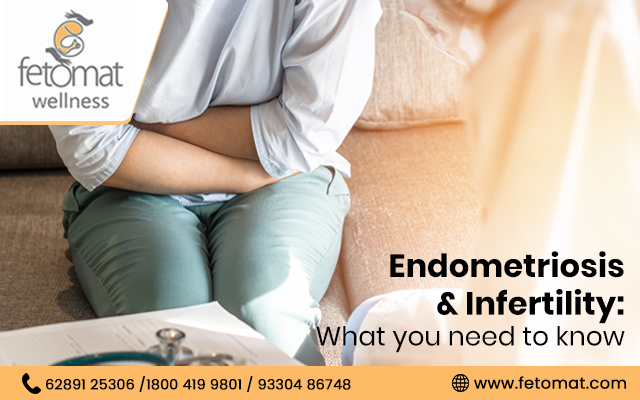Endometriosis is a condition where tissue similar to the lining of the uterus (called the endometrium) grows outside of the uterus in places such as the ovaries, fallopian tubes and the lining of the pelvis. This tissue can cause inflammation, scarring and formation of cysts which can result in significant pain and discomfort, particularly during menstrual periods.
Endometriosis is a public health issue that affects about 247 million women globally (roughly 10% of reproductive-age women), with a particularly high prevalence in India. The condition can cause various symptoms that can significantly impact the quality of life, including severe pain during menstrual periods, sexual intercourse, bowel movements and urination. An expert of an infertility evaluation treatment centre states that chronic pelvic pain, abdominal bloating, nausea, fatigue and mood changes can also be associated with endometriosis.
Currently, there is no known cure for endometriosis and treatment is generally based on managing the symptoms.
Can endometriosis cause infertility?
Endometriosis is a significant cause of infertility. It has been found that around 25-50% of infertile women suffer from this condition. Moreover, 30-50% of women with endometriosis experience infertility. While endometriosis is typically associated with pain and infertility, it’s worth noting that up to 25% of patients may be asymptomatic.
A well-known gynaecologist of a fertility centre in Kolkata says that in healthy couples, fecundity is typically in the range of 0.15 to 0.20 per month and declines with age. Women with endometriosis tend to have a lower monthly fecundity rate ranging from approximately 0.02 to 0.1 per month. This reduced fecundity is thought to be due to the effects of endometriosis on the reproductive organs, including the ovaries, fallopian tubes and uterus.
Early diagnosis of endometriosis can be challenging due to lack of awareness about this condition. This can lead to a delay in diagnosis and treatment which can result in further complications.
In addition, access to early and effective diagnosis and treatment of endometriosis can be limited, particularly in low- and middle-income countries where resources may be scarce or unavailable, stated an infertility specialist in Kolkata. This can further contribute to delays in diagnosis and treatment, which can have significant consequences for women’s health and quality of life.
Impact of Endometrioma on follicle reserve and tubal function
During clinical management of infertility in women with endometriosis, experts of an infertility evaluation treatment centre take into account various factors such as the age of the female, duration of infertility, male factor, duration of medical attention, pelvic pain and stage of endometriosis.
Medical treatment for endometriosis is primarily aimed at relieving pain and other symptoms associated with the condition. While medical therapy can be effective for pain relief, there is no evidence to suggest that it improves fertility in women with endometriosis.
An infertility specialist may recommend various medications such as hormonal contraceptives, oral contraceptives, progesterone injections, Danazol and gonadotropin-releasing hormone (GnRH) agonists to inhibit ovulation or achieve an anovulatory state in order to stop the growth of endometrial tissue. These medications provide short-term relief from symptoms but long-term use can lead to unwanted side effects such as hot flashes, weight gain, facial hair growth, and loss of bone mass.
Surgical treatment options for endometriosis
Cystectomy of endometriomas, especially larger ones, may harm ovarian reserve and decrease the number of available oocytes for future fertility treatments such as IVF. Therefore, ablation or drainage of the cysts may be preferred over excision in certain cases.
In cases of minimal to mild endometriosis, ablation of endometriotic lesions along with adhesiolysis has been found to be effective in improving fertility as compared to diagnostic laparoscopy alone, says an expert of a fertility centre in Kolkata.
However, for larger cystic ovarian endometriomas, the goal of proactive management is to ablate the endometrial tissue from the endometrioma before devascularization and follicle loss in the endometrioma bed to preserve ovarian function. But there is an increased risk of cyst recurrence after ablation. Therefore, the decision regarding the type of surgical intervention should be made on an individual basis, taking into consideration the patient’s age, ovarian reserve and fertility goals.
A reputed gynaecologist of a fertility centre in Kolkata states that IVF (In vitro fertilization) is a suitable treatment for women with endometriosis who are unable to conceive. Additionally, IVF can also provide opportunities if there is a male infertility issue or other treatments have failed.
Conclusion
Proactive management of endometriosis and infertility requires a multidisciplinary approach. It is essential to individualize treatment plans based on the severity of endometriosis, the age of the patient, and other relevant factors to optimize outcomes and improve the quality of life for women affected by this condition.
Patient Review
“Nice place Dr pradeep goswami is like a god fully satisfied”
Siddhartha Bhatia

